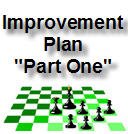 Chess: The cerebral frontier. These are the voyages of the patzer, Rook Van Winkle. His never ending mission to explore the strange world of chess, to seek out new tactics and odd openings, to boldly move where no pawn or piece has gone before...
Chess: The cerebral frontier. These are the voyages of the patzer, Rook Van Winkle. His never ending mission to explore the strange world of chess, to seek out new tactics and odd openings, to boldly move where no pawn or piece has gone before...
I was just working on a brief statement defining my overall goal in undertaking my chess improvement plan and somehow Star Trek popped into my mind.
But now let me be serious. My "About Me" section describes why I have gotten back into chess after all these years - so I won't repeat that. What I need is a simple statement describing why I want to become a better chess player.
Ultimate Goal: To become a better chess player in order to enjoy the game better.
I don't want to set any artificial goals such as a) I will become an Expert Level Player before I die, or b) I will win 75% of all the games I play, or c) I will complete 5000 tactical problems in five minutes.
The better I am and the more I know about chess the better I will a) appreciate my games and the games of others (amateur and master alike) b) grasp the nuances of the openings, middle, and end games and c) derive satisfaction from every hard fought well-played game that I play - win or lose.
Obviously, concerning item c), the stronger I am as a chess player the more likely I can offer myself and my opponent a hard fought well-played game :-)
My Specific Goals:
These are based mainly on recommendations by Dan Heisman, Susan Polgar's advice to Emily Liu at Emily's Chess Blog, and other suggestions I've come across from other chess player's chronicling their own chess improvement plans.
- Play at least one game of chess per day.
- Improve my knowledge and utilization of chess tactics and set aside time each day to practice those tactics - even if only 15 minutes per day to start.
- Pick one opening to specialize with when playing white and learn it well.
- Learn two good openings as black to use against 1.e4 and 1.d4.
- Improve my understanding of endgame positions.
- Improve my understanding of middle game strategies.
- Improve my time management during a game, i.e. slow down and make the most use of the time allocated.
- Learn not to always recklessly attack but to play defensively when the situation requires it. (This is a particularly bothersome deficiency of mine)
- Annotate my own games immediately after playing them – especially my losses in order to learn from my mistakes
- Get more practice at recording my moves in algebraic notation.
- Get more practice playing games with a chess clock.
- Observe some annotated games of the top rated players.
Some possible additional long term goals :
- Have a basic recognition of all the major openings by name, their first few defining moves, and the resulting board positions or "tabiyas".
- Become familiar with some of the classic games of the "masters" past and present.
- Read (and hopefully learn from) some of the classic books on chess.
- Teach other novices, kids and adults, the basic of playing chess.
That ends my initial list of goals - although I may come back to them later to add, delete, or re-order them.
No comments:
Post a Comment